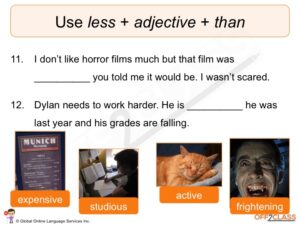{{ post.title }}
{{ post.excerpt }}
Read full storyA quick bit of background…
Over the last two years I’ve been teaching ESL to a number of adults, adolescents and young learners online. Most of my students are from Turkey (where I was previously teaching) and are between the ages of eight and thirteen (although I have taught students as young as six, online). Most of my classes are a mix of literature (focusing on school syllabus) and general grammar or vocabulary.
Young learners are busy people!
A lot of my young learners are as busy as any teachers. They are often enrolled in after-school and weekend extra-curricular activities and sports, so they can sometimes be a little tired and possibly unmotivated for a lesson after school or football training. Nevertheless, young learners are generally very easy to manage and it doesn’t take much to increase the odd sagging level of motivation. Here are some techniques that I developed to boost the energy levels of my young learners online:
Keep personal notes on your students…
If you are teaching students online, it is important to keep some personal notes on your students. Less abut what they are studying at school and more about the most recent film they saw or computer game they were playing. The advantage of being online is that you can take notes discreetly and it does not distract the students. Make notes of their favorites sports, computer games, foods etc… Also jot down the names of their brothers, sisters and friends and note upcoming events like sports competitions, birthdays or holidays.
…and open with personalized leading questions
Don’t commence a lesson with a young learner by asking, “How was your day today?” or “What did you do in English class at school?” A question like this elicits only a very short, forced response and won’t be helpful for raising the energy level at the beginning of a class. With up-to-date notes you can lead with a question like, “Did you place well in your swim meet yesterday?” or “How was the new Avengers movie?” It is such a simple thing to ask a personal question and it really does raise energy levels at the beginning of a lesson.
…and continue to personalize the lesson throughout
A well structured set of student notes can be used to add a personal flavor to the entire online lesson for your young learner. Most of our lesson content is flexible enough to be adapted for your specific student’s interests. Consider this slide for example. If you know your student loves racing cars you can focus on picture B and expand on it, with follow up questions (e.g. Who has got the fastest car in racing today? Does Schumacher drive a Ferrari or a Porsche?). Never be afraid to divert from the grammar-at-hand, since students become more actively involved when lesson contact relates to their lives.
of our lesson content is flexible enough to be adapted for your specific student’s interests. Consider this slide for example. If you know your student loves racing cars you can focus on picture B and expand on it, with follow up questions (e.g. Who has got the fastest car in racing today? Does Schumacher drive a Ferrari or a Porsche?). Never be afraid to divert from the grammar-at-hand, since students become more actively involved when lesson contact relates to their lives.
Take a flexible approach
Your young learner may have an upcoming test on the Present Perfect Continuous but if it is 9pm and energy levels are low, you may need to switch to something lighter. Keep a treasure chest of vocabulary-focused lesson content that suits your student’s interests just for times like these. It may seem obvious, but always have something on stand-by for use with a young learner. When you notice that attention and concentration is waning, it is much better to change topic that to force the student begrudgingly to the final exercise in your proposed lesson plan.
We also offer a number of vocabulary-focused lessons in our lesson content library.
Leave a reply